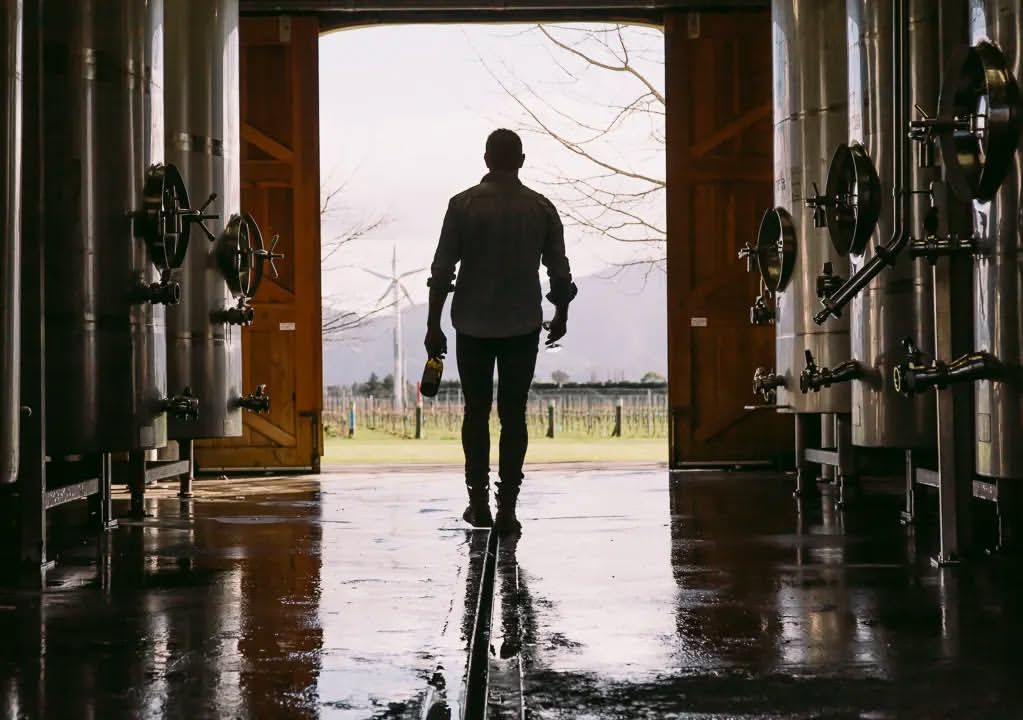There can be few winemakers who are fitter than Jeremy McKenzie of Isabel Estate in Marlborough. When I met him for a tasting of his wines over a lunch hosted by the winery’s importer, Bancroft Wines, in London recently, the svelte New Zealander let it slip that he had spent two hours on the bike in the gym that morning.
That was a doddle for him as he had been doing what he called “quite a few big stints these last few weeks” including five consecutive hours between 4am and 9am on the velodrome in Marlborough, averaging 31km per hour, to raise funds for a children’s charity.
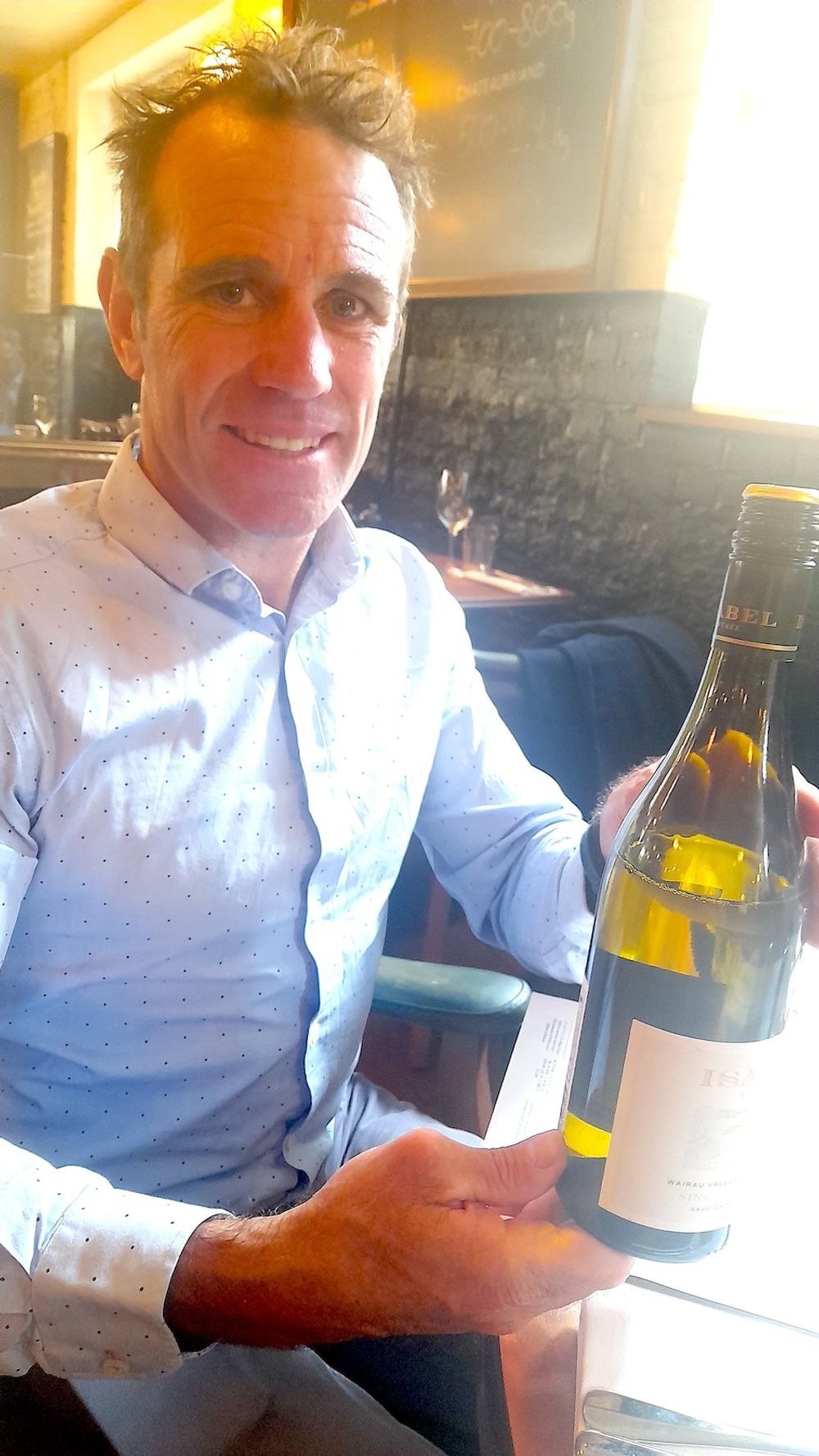
Jeremy McKenzie, chief winemaker, London, July 2025
Even during harvest, McKenzie barely relents on his rigorous training regime. “I nip across to the new mountain bike track the other side of the Wairau River at Storey’s Creek, blaze out for an hour, then jump in the river on the way back, shower at Isabel and rock into work ready for the next eight hours,” he mused.
Towards the end of this year, he will compete in the Godzone Ultra event on the South Island when 30 teams of four will cover 700 km in eight days across New Zealand’s wilderness in what event organisers call “the most technically challenging adventure race in the world.”
“It’s the ultimate race because of the terrain, a lot of which is mountainous,” McKenzie said. “The route is kept secret until it starts, and disciplines include mountain-biking, trekking, running, pack rafting and roping.” The event is an international one with teams from Australia and Brazil also taking part.
No ordinary estate
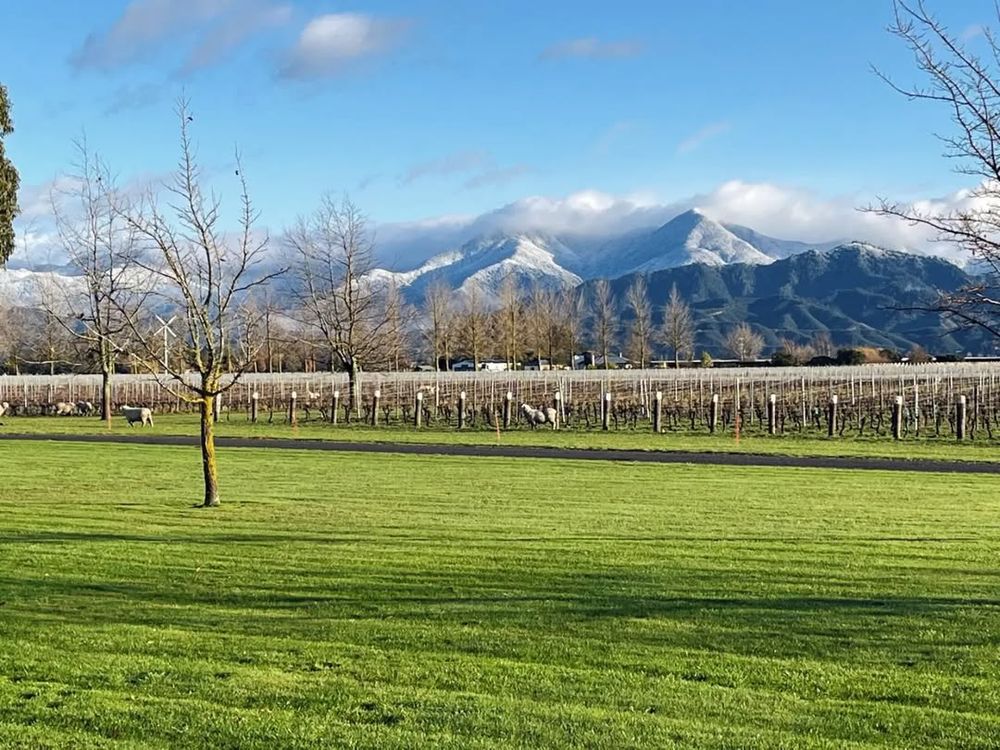
Isabel Estate with snow-capped Richmond Ridge in the distance
If McKenzie, then, is not your typical winemaker, nor is Isabel your average estate. Located in the Wairau Valley area, the site itself is unusual for Marlborough, combining free-draining gravels with a narrow layer of clay in the subsoil, preventing excess water loss from the gravel. Of Isabel’s 43 hectares, 16 are certified organic, with more in conversion and the rest farmed sustainably.
Indeed, Isabel is very much Marlborough aristocracy, with its vines planted as far back as 1980. Through the ‘80s, much of the fruit off them was bought by David Hohnen, who played such a big part in promoting New Zealand Sauvignon Blanc to the world by founding Cloudy Bay in the mid-1980s.
“David said the Isabel Chardonnay was world-class,” McKenzie declared. “It was the Gin-Gin clone, aka Mendoza, from the Houghton estate in Western Australia. We’re really lucky to have that vine material, which is over 40-years old now, and old for Marlborough.”
“It’s part of the fabric of Marlborough that’s so key to the region – whether it’s Cloudy Bay or us or Dog Point. We’re the heart and soul of the region. We know there’s a lot of Sauvignon that’s got no name, no footprint, no bricks and mortar. But what we and other key producers have got should be looked after.”
We tasted the Isabel 2024 Sauvignon Blanc, which comes from a single vineyard and has been very well-received in competitions.
“It was a fantastic vintage,” McKenzie continued. “It’s estate-bottled and produced…quite different to a lot of properties in Marlborough now. It’s very much that provenance story, and the style of winemaking is very different as well. There’s a lot more going on in there - there’s 15% in old French oak that’s naturally fermented and left on the lees; a riper fruit profile with softer acidity. Not a sharp racy number, just really well-balanced and a great food wine.”
That softer acidity comes from a pH that is a little higher at 3.25 than in a lot of New Zealand Sauvignons which tend to hover around 3.15. According to McKenzie, that higher pH comes down to the lower cropping with 3.5 kilos of fruit per two-caned vine, and 4,000 vines per hectare compared to the norm of 8,000. Lower density also helps give better fruit ripeness.
“All that sort of stuff lends itself to what we’re aiming for – almost a house style that doesn’t have searing acidity and isn’t a fruit bomb.” McKenzie declared. “We’re always picking to land at 12.8% alcohol and 2.5g/l of residual sugar. That’s where we like it every year to be so that we have that richer fruit structure driving into the wine, with time on lees to keep that ageability as well. That’s the other thing about Isabel – the ageability not just of the Pinot Noir and Chardonnay but also the Sauvignon. The ’23 still looks fantastic, and we have library stock going back years.”
Best kept secret
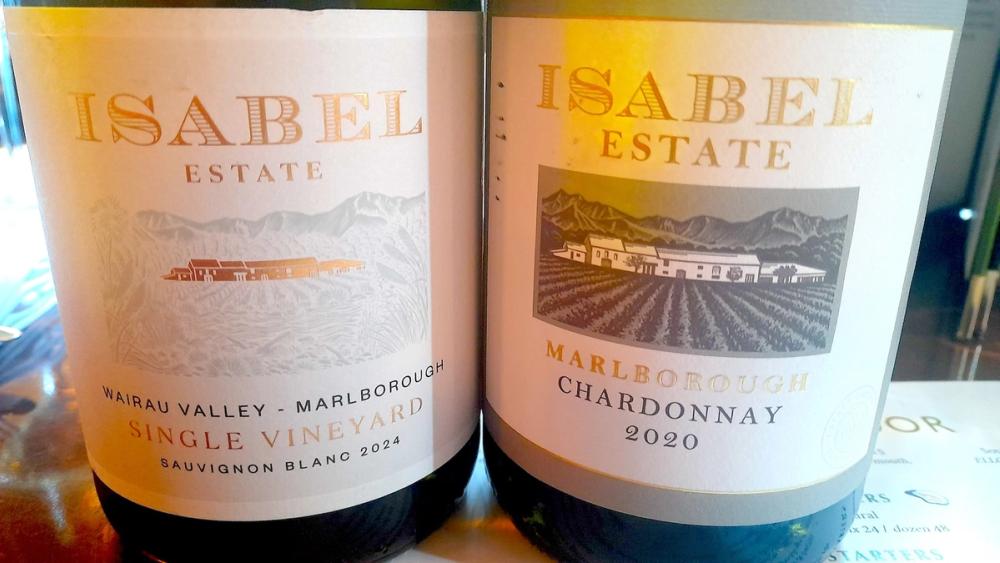
Even though Hohnen recognised its quality long ago, Isabel’s Chardonnay was perhaps Marlborough’s best-kept secret until relatively recently. From 2016 when the estate Chardonnay won Air New Zealand’s Chardonnay award, it has consistently picked up trophies. Then, in 2022, when McKenzie was voted NZ winemaker of the year, the Isabel Estate Wild Barrique Chardonnay ’22 was ‘wine of the year’ at the London Wine Competition.
“It was really good for the team as most of the guys have been with us since inception [more than a decade ago], with many coming over from Villa Maria with me,” McKenzie said of that award.
“We’re a very close-knit team of five or six, all super-passionate about Chardonnay. For me, it’s more about the brand, and wanting to see it thrive and get it back to its global status.” As much as 90% of Isabel Estate’s overall production is exported, with Australia a key market, as well as Japan, Korea and the UK.
Isabel has eight hectares of Chardonnay, the majority of which is certified organic or in organic conversion. Crucially, it has really good clonal material, with three clones – 548, 95 and 15 – added to the original Mendoza one. The latter is found in two blocks from which the Wild Barrique is made.
“It’s such a cool site, with that heavier clay soil,’ McKenzie said. “Viticulture is the key thing - we don't like to have a lot of exposure through the leaf area and fruit zone so that we maintain that acidity. We start with over 10g/l of TA and a pH of 2.95/98, so we put it through 100% malolactic fermentation. We shake some acidity out by giving it extended time on the lees, which allows the fruit and oak notes to intertwine well. We use 30% new French puncheons.”
“As the Mendoza Chardonnay comes out early in October, and you can get frosts through till November, we have a month when we’re on tenterhooks, hoping no frosts and chopper bills of 25-grand.”
If the Wild Barrique Chardonnay 2022, with its melange of lime, white peach and grapefruit flavours as well as saline and mineral notes, wowed the judges, then the Isabel Estate ‘Aratoro’ Single Vineyard Chardonnay 2021 raises the bar yet higher. Translated as ‘Path of Discovery’ this is only released in exceptional vintages, and is made in small quantities (1800 bottles in that year).
Six parcels of Chardonnay (Mendoza clone) and Pinot Noir (Abel and 777 clones) on silty clay soil in a valley between the Wither Hills to the south and the Richmond Ranges to the north are home to 45-year old Chardonnay and 30-plus year old Pinot vines, all farmed organically. “Both wines are about provenance and place,” McKenzie said, “with their expression equally as good as Martinborough or Central Otago.”
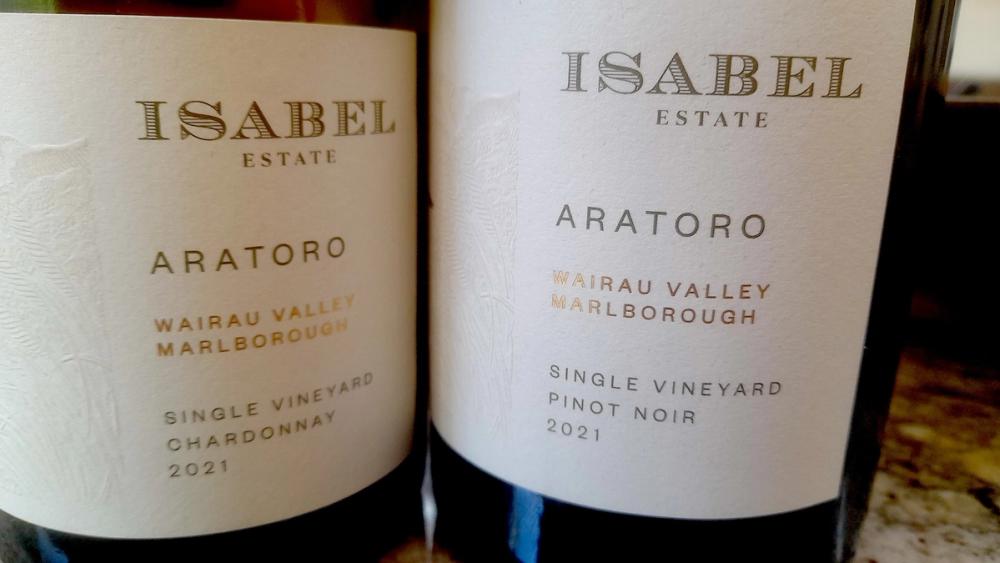
The Aratoro Chardonnay 2021 (13.5% abv) is a wine of sublime balance and poise with pristine, crystalline fruit framed by a scintillating citrus acid line and powder-fine mineral notes. White peach, nectarine, flinty grapefruit, lemon curd, roasted almond and ginger spice are all there. Pithy and saline, the wine is supremely elegant and harmonious, yet wrapped in layers of complexity with dramatic intensity and length. A sensational Chardonnay.
The Aratoro Pinot Noir 2021 (13.5% abv) came from a great vintage for the varietal in Marlborough that has the potential to evolve over many years. McKenzie revealed it had “quite a bit of whole bunch, with some parcels at 100%.”
Beautifully fragrant on the nose with aromas of fresh thyme, violet and red-berried fruit, these mingle with more earthy notes. So vibrant and fresh on the palate, it is blessed with fine-grained tannins that are both silky and plentiful, providing structure. A concentrated, complex core of raspberry, cherry and darker fruits, as well as exotic spice from well-handled oak (30% new, 70% second fill) all stand out. Throw in refined poise, quiet intensity and a compellingly persistent finish, and you have a world-class Pinot.
Sustainability is key
Isabel Estate’s embrace of sustainability is a key driver for them.
“We’re doing a lot of different stuff to most producers in Marlborough,” McKenzie said. “Dog Point is an exception in that they’re 100% organic but we’re nearly 50% organic, which is where we want to get to. We probably won’t go fully organic with all our Sauvignon but we will still be sustainably farmed. All our skins are composted and go back on the vineyard. All our packaging and plastic is recycled, and 70% of our glass too.”
“NZ$10,000 worth of native plants are going in to support the waterways. We have a collaboration with the local primary school where we supply seedlings, they grow them up and use 50% in the school creek, and the other 50% is planted back at Isabel Estate. I’m driving all that. Whoever’s working in the vineyard is accredited, so the people-side of it is well looked after. That’s becoming a more and more talked about thing with suppliers and customers. Our own solar power currently accounts for 20% of our needs, and our aim is 50% renewables by 2030. All our stormwater off roofs and concrete is recycled into the vineyard.”
Damian Carrington, managing director of Bancroft Wines, was at pains to point out the importance of sustainability to his clients.
“It’s commercially imperative as more and more of our customers are asking, if not insisting, on sustainable practices,” he said. “We try to make sure everything we bring over is sustainable. With regard to the Aratoro labels [RRP £72], we have limited access to these special wines, which are available on allocation for the on-trade and independent retailers.”
Buyers and consumers alike may notice a label change for the Sauvignon Blanc and Chardonnay from the 2024 vintage that are designed to highlight Isabel Estate’s single vineyard productions and the Marlborough appellation and Wairau Valley sub-district. The idea is to add both more of the provenance story and some cachet, but the wines of Isabel Estate are so good that the labels barely matter. Take a bow chief winemaker Jeremy McKenzie, senior winemaker Nick Lamain and the team.
